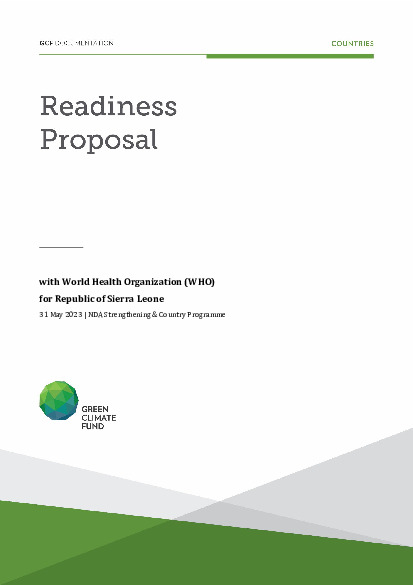Enhancing the Resilience of Health Systems to Climate Change and Emerging Outbreak/Pandemics in Sierra Leone

Enhancing the Resilience of Health Systems to Climate Change and Emerging Outbreak/Pandemics in Sierra Leone
Human health system in Sierra Leone is seriously threatened by climate change, both directly and indirectly through increasing heat stress, increased risk of water- borne diseases, stress on water quality sanitation and hygiene, climate-induced disaster-related mortality and air pollution. Climate change impacts on health in Sierra Leone will also be felt though impacts on health determining sectors such as agriculture and water. Addressing the impacts of climate change and health therefore requires targeted multi-sectoral action that aims to deliver mitigation and adaptation actions to protect human health and strengthen health systems’ resilience to the impacts of climate change.
The Government of Sierra Leone is committed to addressing climate change impacts. The Country’s Agenda for Prosperity (2013-2018) highlights the importance of environmental sustainability and environmental protection, including addressing the impacts of climate change as a critical dimension for the realization of the vision of 80% of the population above the poverty line by 2035. The government has also developed several action plans and strategies for climate change action, including the National Adaptation Plan (in draft), the NAP Framework (2018), National Climate Change Strategy and Action Plan (2015), National Climate Change Policy Framework (NCCP), National Health Sector Strategic Plan 2017-2021 and the National Adaptation programme of Action (NAPA) (2007).
Despite these commitments, strategies and action plans to address the impacts of climate change on health are not yet sufficiently developed. There is limited consideration of climate change and health in the National Health Sector Strategic Plan (2017 – 2021) (currently under review). In addition, considering the health challenges relevant to climate change in SL as well as the vulnerability of the public health system to major epidemics (e.g. Ebola, Covid-19) and health risks (e.g. water and vector borne diseases, malnutrition and food insecurity), MoHS and WHO recommended that the NAP (in draft) include Health as a distinct priority similar to the National Adaptation Plan of Action (NAPA) (2007) in which Health was a distinct sectoral priority.
This proposal aims to ensure that climate change considerations are mainstreamed into National Health Sector Strategic Plan and the National Adaptation Plan. Additionally, there is lack of data and information on the health co-benefits of mitigation and adaptation actions thus a comprehensive analysis of the health impacts of air quality in Freetown and the health co-benefits of mitigation actions against ambient and indoor air pollution is needed.